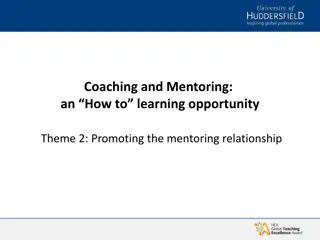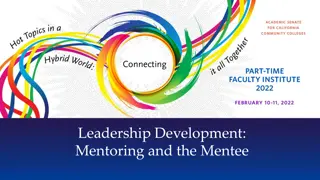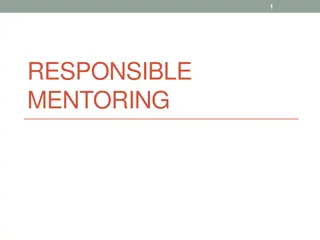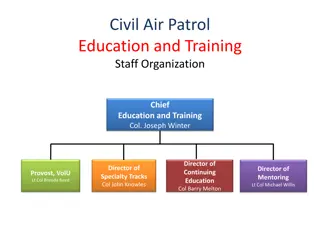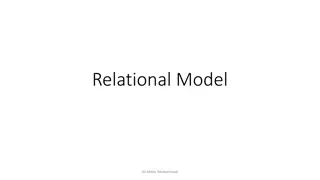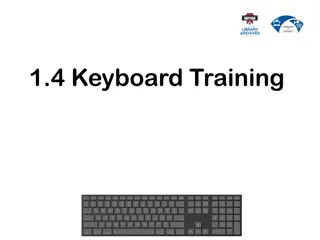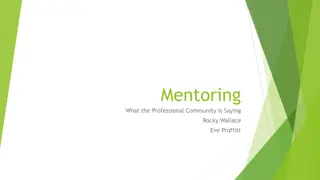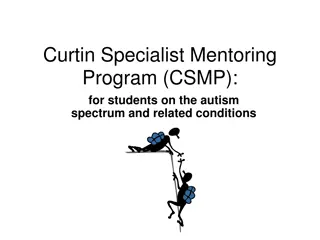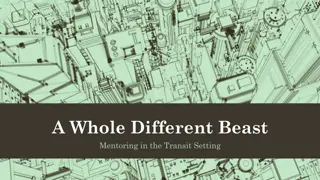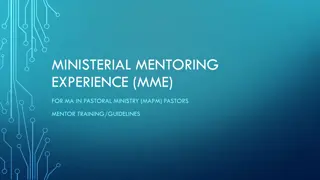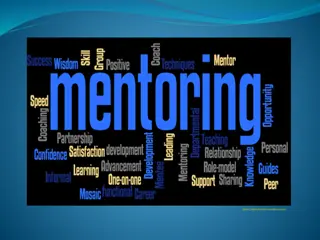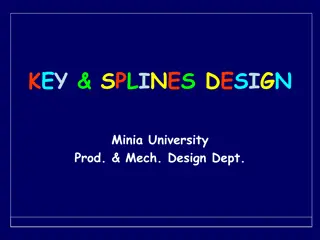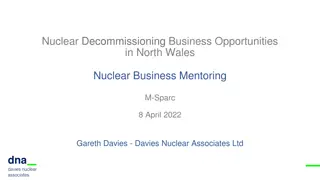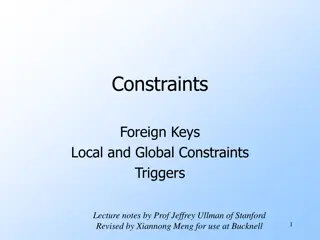Effective Mentoring: Keys to Success
Discover the essential elements of successful mentorship with insights from Dr. Melissa J. Armstrong. Learn about the mentoring process, role responsibilities, and the significance of mentorship in professional and personal development. Uncover practical skills, professional success strategies, and the nuances of the mentor-mentee relationship to thrive in your career. Access valuable resources to enhance your mentoring journey and maximize your potential.
Download Presentation

Please find below an Image/Link to download the presentation.
The content on the website is provided AS IS for your information and personal use only. It may not be sold, licensed, or shared on other websites without obtaining consent from the author.If you encounter any issues during the download, it is possible that the publisher has removed the file from their server.
You are allowed to download the files provided on this website for personal or commercial use, subject to the condition that they are used lawfully. All files are the property of their respective owners.
The content on the website is provided AS IS for your information and personal use only. It may not be sold, licensed, or shared on other websites without obtaining consent from the author.
E N D
Presentation Transcript
How to be a Great Mentee Melissa J. Armstrong, MD, MSc Associate Professor, Associate Chair of Faculty Development Department of Neurology
Resource UCSF Faculty Mentoring Program Toolkit https://facultyacademicaffairs.ucsf.edu/faculty-life/mentoring- resources/UCSF-Faculty-Mentoring-Program-Toolkit-11.02.17.pdf
What is Mentoring Process; mentor and mentee work together to develop & discover mentee s abilities Relationship to facilitate professional success Usually long-term Personal process Combines role modeling, apprenticeship, nurturing Mentor: Teacher, sponsor, guide, exemplar, counselor, moral support Mentor guides mentee in developing and examining his/her/their own ideas, learning, and personal & professional development
Role Responsibility Relationship with Individual Manager Direct the work of the individual - Focused on performance, professional & career development - Based on organizational needs - Inside the hierarchy of direct reporting relationships - Sometimes but not always confidential Sponsor Champion the individual - Focused on career development and advancement - Driven by advancement goals rather than a learning agenda - Inside or outside the hierarchy of direct reporting relationships - Sometimes but not always confidential Mentor Guide and support the individual - Focused on professional and personal development - Based on mentee s expressed needs - Driven by specific learning agenda identified by mentee - May (should?) be outside the hierarchy of direct reporting relationships - Confidential
Elements of Mentorship Discovery: Partner to discover, develop mentee s abilities Unique, individualized, listening, respect, understand personal desires/goals, insight Professional success: Driven by mentee goals Connection to local resources Networking Research, collaboration, fellowships, employment, teaching Opportunity Practical skills CV/biosketch, teaching, finding grants, grant writing, manuscripts, running meetings, budgets, interviews Personal guidance (role modeling, counseling, support)
Finding & Selecting Mentors Senior faculty Peer mentors Look for formal and informal mentoring Maximum 2-3 career mentors Mentor characteristics/considerations Match of professional and/or personal needs Commitment to mentoring, interested in developing your career Successful track record Good communication skills Provides networking opportunities Interest in you as a person Background Gender, race/ethnicity, age Personal chemistry
Drive the Relationship Reach out to schedule meetings Set goals to review with mentors Clarify commitment and expectations Scheduling and logistics of meeting Frequency and mode of communicating between meetings Confidentiality Off-limits conversations Giving and receiving feedback Working with formalized mentee goals Be prepared come with an agenda, questions
Be a Pro-Active Mentee Consider the following questions: Most successful = mentee takes initiative and drives the partnership Mentee determines pace, route, destination Mentor offers insights & counsel based on mentee s objective 1. Are my objectives clear and well-defined? 2. Am I comfortable asking for what I want? 3. Am I open to hearing new ideas & perspectives? 4. Do I allow myself to be open and vulnerable? 5. Am I receptive to constructive feedback? 6. Am I able to show I value and appreciate feedback? 7. Am I willing to change or modify my behaviors? 8. Do I consistently follow through on commitments? 9. Do I make an effort to instill trust? 10. Do I openly show appreciate and gratitude?
Be Courageous Ask questions even if the answers seem obvious Show that you are open to feedback View feedback as a gift Share your goals with your mentor Tell your mentor how they can help you the most Admit when you re not sure about something Be trustworthy
Be realistic Remember that mentors aren t perfect Recognize that one mentor can t meet all your needs Respect your mentor s time (with scheduling, deadlines) Know that your mentor is probably busier than you can imagine
Provide Value, Show Gratitude Provide your mentors with opportunities to learn Share an article, follow up on a discussion with information Attend speaking engagement Listen if mentor needs someone Give feedback Show gratitude
Mentee Dos and Donts Do: Take initiative Look for opportunities to teach your mentor Be respectful of mentor s time Communicate agenda and goals with mentor prior to meeting Clarify goals and expectations Practice self-reflection Support your peers Keep your CV, IDP, etc. up to date Have multiple mentors Clarify your values Don t: Be passive Don t wait for the mentor to initiate interactions Be late, disorganized Stay in the comfort zone Stay in a mentoring relationship when it is no longer helpful UCSF Faculty Mentoring Program Toolkit
10 Tips for Being a Good Mentee 1. Remember your mentor is a volunteer 2. Take responsibility for your own learning 3. Develop trust 4. Be respectful of your mentor s time 5. Set realistic expectations with your mentor 6. Come to each meeting with a prepared agenda 7. Be open about your needs and provide feedback to your mentor 8. Recognize your mentor s limitations 9. Take appropriate risks 10. Be flexible and learn From Insala blog 6/3/2019; insala.com
10 Quick Ideas for Becoming a More Effective Mentee 1. Drive the relationship 2. Balance formal and informal mentoring 3. Seek the most personal means to connect 4. Be courageous 5. Be clear about the ask 6. View feedback as a gift 7. Provide value 8. Be prepared 9. Have realistic expectations 10. Show gratitude https://er.educause.edu/blogs/2020/8/10-quick-ideas-for-becoming-a-more-effective-mentee
Peer Mentoring Two people in similar positions help each other Less formal than traditional mentoring relationships Should be mutually beneficial Particularly helpful for: Onboarding Accountability (e.g. progress on projects) Collaborative learning Networking
Possible Discussion Topics Reaction to presentation Questions about mentoring Experiences as mentee Experiences as mentor Approach to work-life balance



